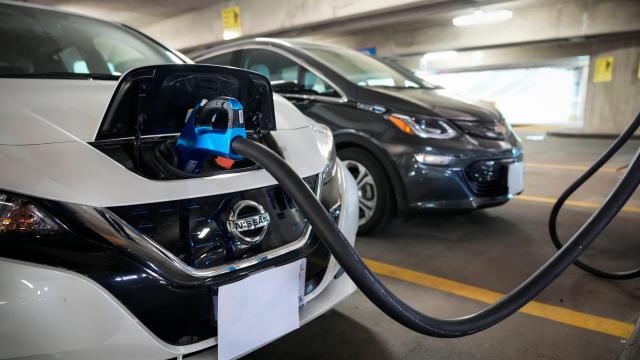The world may be one baby step closer to ditching petrol-powered cars thanks to a new agreement among nations, companies, and cities aimed at ending fossil fuel vehicles by 2040. The pledge, called, The Glasgow Declaration on Zero Emission Cars and Vans, was introduced at this year’s COP26 climate conference.
Major carmakers involved include General Motors, Volvo, Mercedes-Benz, and Jaguar Land Rover; India, the United Kingdom, New Zealand, and Poland were among a lengthy list of countries to add their name to the pledge. Other major private companies like Uber and Siemens also signed on. New York, Los Angeles, Dallas, Lagos, Sao Paulo, and Buenos Aires are among the cities included in the zero-emission vehicles pledge.
According to the declaration, signatories will work towards making all new car sales be zero emissions by 2040 or earlier, and 2035 or earlier in leading markets. The declaration also went on to note the importance of increased investment in research and manufacturing as well as alternative forms of transportation.
“We recognise that alongside the shift to zero emission vehicles, a sustainable future for road transport will require wider system transformation, including support for active travel, public and shared transport, as well as addressing the full value chain impacts from vehicle production, use and disposal,” the declaration notes.
Though the declaration did include some major names, those left out are equally as important. Notably, while several U.S. states agreed to the commitments, the U.S. as a county did not. That’s a huge missed opportunity as the biggest source of U.S. emissions is currently transportation. And it’s odd given that Presiden Joe Biden has talked up electric cars and touted EV charging infrastructure in the bipartisan infrastructure bill that just passed.
China, the world’s single largest emitter of greenhouse gases, also didn’t sign on. The country also has the largest EV market by sales and is expected to lead the way in EV adoption in coming years, though, according to research firm Canalys.
The world’s two largest carmakers, Volkswagen and Toyota, were also absent. Earlier this year, Volkswagen said it hopes more than 70% of its European car sales and 50% of U.S. sales would be electric by 2030. Toyota, meanwhile, recently announced it would spend $US13.5 (A$18.41) billion worldwide over the next 10 years on EV battery development but has been less committed on EV adoption dates. The company, though, has also opposed climate legislation while Volkswagen, well, you know.
The urgent timeline for mass EV adoption are necessary due to transportation’s outside effect on global emissions. In the U.S. alone in 2019, transportation accounted for 29% of all greenhouse gas emissions, according to the Environmental Protection Agency. Globally, transportation accounted for 24% of carbon dioxide emissions, notes the International Energy Agency.
At the same time, however, some experts worry the sudden rapid switch towards EVs could strain current manufacturing channels and supply chains. The beginning of that is already being seen in EV battery production, where the price of key metals needed for the batteries has risen sharply, according to Bloomberg. These issues were reportedly top of mind for Volkswagen CEO Herbert Diess’ decision not to join the declaration.
“We need raw materials, new mines, a circular economy. Battery capacity and building renewable energy grids across Europe will be the bottleneck,” Diess said at a conference on Wednesday.
Looking forward, vehicle commitments are only part of the question. Indeed, we need to end fossil fuel production entirely if we’re to even come close to meeting the Paris Agreement’s goal of 1.5-degree-Celsius.
Also, increasingly, advances in EV battery life to extend the range and massive investment from countries to build out charging infrastructure will be needed to make EVs viable on a society-wide level. For some context, range anxiety was the number one cited factor in purchasing decisions for U.S. EV owners, according to a recent J.D. Power survey, with charging infrastructure also a major concern.
This uncertainty around infrastructure was another some automakers refrained from the declaration, reports Reuters. In their view, the pledge puts the onus of new investment on them to create new technologies while failing to impose similar commitments from governments.
To that end, there’s some reason to hold out hope In the U.S., the House passed a $US1 (A$1.36) trillion infrastructure bill that includes $US7.5 (A$10.23) billion in funding towards a nationwide charging network. Meanwhile, Tesla, arguably the leader in charging on the commercial side, just began opening up its supercharger network to non-Tesla vehicles in the Netherlands, with plans to expand.
